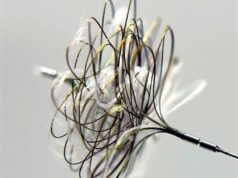 The National Institutes of Health (NIH) Common Fund has named eight winners of the first phase of the Neuromod Prize—a US$9.8 million competition to accelerate the development of targeted neuromodulation therapies that adjust nerve activity to improve organ function.
The National Institutes of Health (NIH) Common Fund has named eight winners of the first phase of the Neuromod Prize—a US$9.8 million competition to accelerate the development of targeted neuromodulation therapies that adjust nerve activity to improve organ function.
The first phase called on scientists, engineers and clinicians to compete for a share of the initial US$800,000 prize pool by submitting novel concepts and plans for precisely stimulating the peripheral nervous system to treat disease, and improve human health.
With this competition, the NIH is using open innovation to foster approaches that are capable of precisely adjusting nerve activity to restore healthy organ function, while limiting side-effects and improving patient quality of life.
Phase one of the Neuromod Prize received 45 submissions from independent teams, small companies, universities, and medical centres. The eight winners were selected by a federal judging panel and each team was awarded US$100,000 as well as an exclusive invitation to conduct proof-of-concept studies in the second phase of the competition, which is expected to begin later this year.
The eight phase one winners are:
- Anthony F DiMarco—high-frequency spinal cord stimulation reduces respiratory tract infections and improves bowel management in people with neurological impairment.
- BIOS Health—the Autonomic Therapy Initiative. Data-driven stimulations of the vagus nerve using neural biomarkers modulates cardiac function and minimises side-effects on off-target organs.
- General Electric Research, in collaboration with Northwell Health and Yale University—a single, image-guided ultrasound treatment induces a response in the gut-brain sensory pathway to provide sustained remission in Type 2 diabetes and obesity.
- Neuroengineering & Pain Research (NPR) Lab at the University of Connecticut—synchronised pulse and sinusoidal stimulation of sacral dorsal root ganglia and nerve roots relieves chronic visceral pain in the lower abdominal organs by selectively blocking C-fibre neural transmission.
- RBI Medical—ultraprecise, selective pelvic neuromodulation therapy treats stress urinary incontinence, overactive bladder and faecal incontinence using a minimally invasive micro-implant.
- University of Louisville Research Foundation—StimXS. Neuromodulation of the lumbosacral spinal cord automatically regulates cardiovascular, respiratory and urinary systems after spinal cord injury.
- University of Pittsburgh Department of Urology—a multichannel implantable device for sacral-pudendal neuromodulation addresses bladder, bowel and sexual disorders.
- Warren Grill and collaborators, Duke Biomedical Engineering—electrical recording and stimulation of the sacral nerve with closed-loop bioelectronic control restores bladder and bowel function.
“The winning teams have proposed exciting and innovative approaches to treating a variety of conditions, such as diabetes, incontinence, sexual disorders and obesity,” said Elizabeth L Wilder, director of the Office of Strategic Coordination, which oversees the NIH Common Fund. “We await the progress of these teams as they begin to test their solutions through proof-of-concept studies and identify new ways to use neuromodulation to improve human health.”
The Neuromod Prize is part of the NIH Common Fund’s Stimulating Peripheral Activity to Relieve Conditions (SPARC) programme, which has attempted to make critical progress to help accelerate the development of neuromodulation therapies, close fundamental knowledge gaps, and offer tools that enable open science and innovation, through the SPARC portal.
The competition will provide additional resources to help winning teams from phase one accelerate and develop their solutions in phase two. Up to four phase two winners may be selected to advance to phase three and further develop their solutions for translation to clinical use. Phase two will have a total prize pool of up to US$4 million, and phase three will have a total prize pool of up to US$5 million, subject to the availability of funds—according to an NIH press release.









